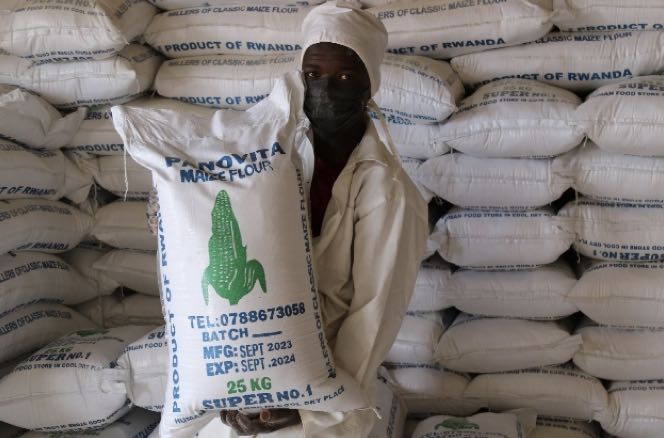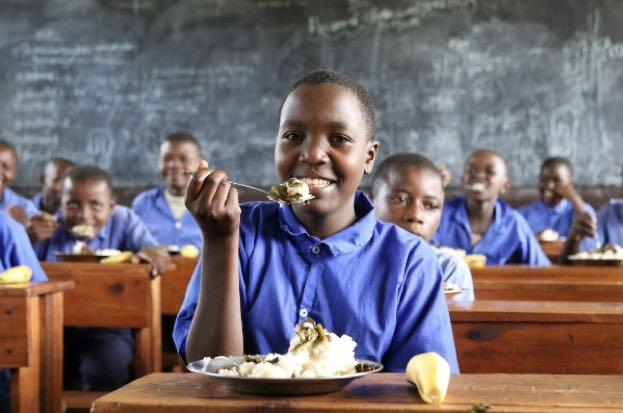
By John-Paul Sesonga;
Ngoma: In the heart of Mandu village, within the gently sloping hills and green landscapes of Karama cell in Kazo sector, Ngoma district, stands a maize processing plant that bears a name of profound meaning – “PANOVITA.” As I approach the facility, the blue gate decorated with the words “PANOVITA” in bold white letters swings open, attracting curiosity to know what’s going on inside.
Men and women in white gowns, with headgear on, are involved in the process of unloading maize grains and loading bags of well-packed maize meal onto trucks bound for the market.
Welcomed by the friendly smile of Jean Bosco Bizimana, the Director General and proprietor of PANOVITA, I inquire about the origin of the name. With pride in his voice, Jean Bosco explains, “The word carries two Latin words, “PANIS is VITA”, meaning Bread is Life.” I learnt; it is a maize meal fortification plant.
The inspiration behind PANOVITA traces back to Jean Bosco’s seven-year time as a medical laboratory officer at Rwinkwavu hospital. Witnessing numerous cases of child malnutrition, particularly in Ngoma district where the stunting level among children under five years is at 37.3 percent, stimulated his determination.

“As a biomedical scientist, I realized that inadequate food intake during the 1,000 days between conception and a child turning 24 months old is critical and may hamper its growth in the following years,” says Jean Bosco.
Driven by a sense of responsibility, he took a bold step, leaving his job to establish a maize processing plant aimed at contributing to saving the lives of young children in rural areas.
Recognizing that 90 percent of Ngoma district’s population rural areas and practice agriculture. Jean Bosco saw the potential in utilizing locally produced maize as the main raw material for fortified maize meal. “There is enough maize production in the area,” he affirms. “There is also potential for demand from the local population, the densely populated district and supply, to a nearby refugee camp hosting over 63,000 refugees from the Democratic Republic of the Congo and Burundi, and to schools in the National School Feeding Programme.”
PANOVITA began production in 2012, initially supplying to the local market. However, a game-changing opportunity presented itself when Jean Bosco learned about the World Food Programme (WFP) and Impact Hub Kigali’s IGNITE Food Systems Challenge competition.
Despite uncertainties, he prepared his submission diligently to compete and, to his satisfaction, emerged as one of the winners, receiving a US$30,000 grant. Grateful for the support from the USAID Bureau for Humanitarian Assistance and the Danish Ministry of Foreign Affairs, he used the grant to acquire essential food processing machinery, significantly boosting his fortified maize meal production.
WFP’s IGNITE Food Systems Challenge has played a pivotal role in supporting PANOVITA’s growth. This initiative, aimed at empowering Rwandan start-ups, SMEs, and cooperatives, provides not just financial support but also technical assistance.
With a total of US$300,000 in financial support, it encourages entrepreneurial solutions that address various gaps in the food system, contributing to food security, resilience, and the well-being of communities.
Jean Bosco emphasizes the value of aggregating quality maize from farmers: PANOVITA is linked to four smallholder farmers’ cooperatives in Ngoma and Kirehe districts supported by WFP. This connection coincided with the government’s new school feeding procurement modality, allowing districts to procure long-shelf-life commodities for school meals locally. PANOVITA secured a district contract to supply fortified maize meal to 20 schools, a move that has far-reaching positive effects on both farmers and schoolchildren.
“I buy maize directly from smallholder farmers,” Jean Bosco proudly states. This contractual arrangement not only provides income to local farmers but also contributes to poverty reduction. As maize meal and beans are supplied to schools, children benefit from nutritious meals sourced from their local communities, fostering self-sufficiency.
One of the schools enjoying the benefits is Gahurire Primary School. With over 1,600 students, the school’s head teacher, Jean Damascene Ndagije, expresses joy over the positive impact.
“No children miss the class lessons because everyone is eager to arrive at school on time to study and wait for lunchtime to eat,” he shares.
The school has saved considerable funds by receiving maize meal directly from PANOVITA, purchased by the district enabling the school to invest in additional nutritious options like vegetables and fruits for the students using parent contributions.
Jean Bosco’s journey from a medical laboratory officer to the visionary behind PANOVITA exemplifies the transformative power of entrepreneurship and compassion. His dedication to combating child malnutrition has not only saved lives but has also created a sustainable model that empowers local communities and ensures the well-being of future generations.
PANOVITA stands not just as a maize processing plant but also as a beacon of hope and change in the heart of Ngoma district. (End)
